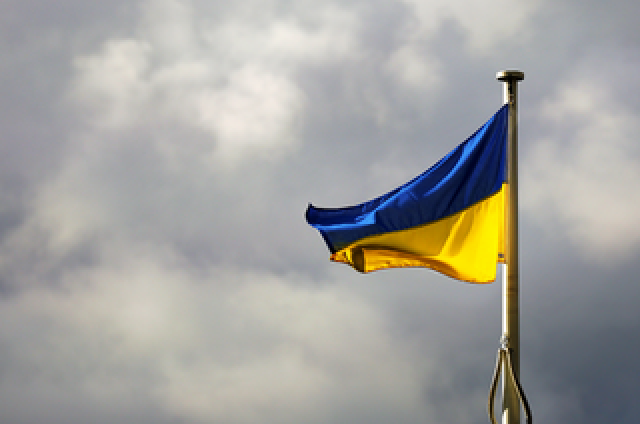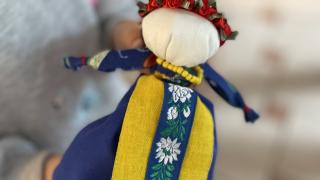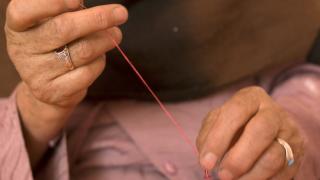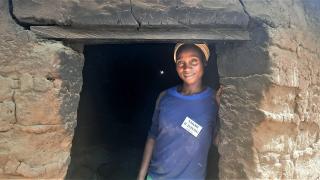When will it end? Fighting back with solidarity
More than one year since Russia’s brutal invasion and women say that the snow on the ground and the fears of a repeat invasion are giving them flashbacks to when the war began.
More than year since headlines were shouting warnings of the looming invasion, to before life irrevocably changed overnight for millions of people.
An estimated 90% of refugees from Ukraine are women and children, with more than 1.5 million are now in Poland. Almost 6 million people are internally displaced.
As three organisations, we joined forces in the early days of the invasion to serve women refugees in Poland, many of whom are grappling with the questions “What if isn’t over soon? What if we can’t ever go home?”.
In reality, even if this war ends tomorrow, many have no ‘homes’ to go back to, with homes levelled to the ground and loved ones lost. The trauma they carry means the future seems bleak. Our job is to stand by their sides and support them in moving forward.
We hear of the physical effects of war, but the toll war takes on people’s mental health often goes unreported. The women we work with have complex needs. Many are now single parents; others are grieving the loss of children. Women are struggling to find work while dealing with the trauma, disorientation and isolation caused by war.
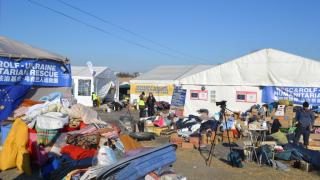
As women crossed over from Ukraine to Poland, we asked women what they needed most urgently. They had just left their homes with no sense of when, or if, they would return. Bringing with them only what they could carry, they fled air raids leaving behind life as they knew it. They asked for two things: help finding a job and psychological support.
Through our partnership with HumanDoc Foundation in Poland, we provide safe spaces for women to gather, medical care including psychological and gynaecological consultations, gender-based violence counselling and prevention strategies, trauma-informed care, vocational training, Polish language classes and legal assistance etc. We are sharing expertise based on learnings from the Bosnian War and other conflicts since, and our programme is holistic, supporting women in various aspects of their lives – because the effects of war are all-encompassing.
Take Olga. Her husband was shot after finding himself in front of a Russian tank on his way home one day last year. He died while Olga was home, terrified by the sound of bombs approaching. She told us:
It took less than one minute to destroy 25 years of a happy marriage. All the dreams we dreamt together and our plans for the future suddenly disappeared with his death.
Olga made the difficult decision to flee to Poland to protect her son. When we met her, Olga was considering suicide – her son was the only thing keeping her alive. Through Bereginja’s psychological support services, Olga has been working through her trauma.
Psychological stress takes a toll on physical health too, adding to the challenges of securing and keeping a new job. We cannot expect women to recover psychologically and accept their new reality, when they are unemployed, financially reliant on government schemes or aid and unable to support their families. Many of the women we work with have left stable careers they loved, and now lack the self-confidence and independence that their work gave them. While finding sisterhood and understanding, Olga also had our support to find work in a bakery.
“I'm a former lawyer and used to working in an office, so this is a very different kind of work for me. But I'm grateful that this job gives me a steady income, allowing me to rent a cosy little apartment for my daughter and me … With the help of the therapy sessions, I can see how resilient I am, and I'm starting to feel that I want to socialise more and probably start looking for an opportunity in my area of expertise.”
First founded in 1993 in response to the Bosnian War, Women for Women International facilitated women around the globe to stand in solidarity with their Bosnian sisters. Shocked and saddened by the atrocities in a war which saw up to 50,000 women raped, people worldwide wrote letters of support, sending strength and hope for a more equal, peaceful and prosperous future. To be in that terrible place and receive letters from people supporting you provides something that is always needed in war: hope and friendship. There’s power in that; in being loved and cared for.
30 years have passed, but we see history repeat itself again and again and again. Horrific reports of rape by Russian troops are mounting, and these are just a fraction of what actually occurs.
From Bosnia and Herzegovina to Rwanda – and now Ukraine – this pattern is familiar. Women survivors who have gone through intense trauma are often unwilling to talk about their experience for decades afterwards. Women for Women International and Žene za Žene International (Women for Women International in Bosnian) are working within Ukraine too, supporting women and children who are internally displaced. Our partner Iryna Andreeva at the Andreev Foundation says women in Ukraine are afraid to speak about abuse. They fear the Russians will come back and they are scared for their lives – while also afraid of the shame and stigma they would face in their communities.
In the face of such weapons of war – sexual violence, tanks and explosives – women’s solidarity is our weapon, helping women to survive and pave the way towards a more peaceful future. We continue bringing women together to support each other. Through our services, women like Olga learn to move forward, rebuild their lives, support their families and strengthen their communities.
We may not know when this war will end, but we know women have the power to survive this – together.
We know this because our sisters in Bosnia and Herzegovina, Kosovo, Rwanda, Iraq and elsewhere show us every day. But we also know that war crimes need to be prosecuted and perpetrators held to account. It was the trial of four members of the Bosnian armed forces in 1998 that led to the International Criminal Court recognising rape, sexual slavery, enforced prostitution, forced pregnancy, enforced sterilisation and “any other forms of sexual violence of comparable gravity” as crimes against humanity and as war crimes. Experiences of violence are rarely one-offs and can make survivors more vulnerable to future abuses.
The war in Ukraine has many parallels with what we saw in Bosnia and Herzegovina, but one key difference is the ability to share information from on the ground. During the siege in Sarajevo many people did not have water or electricity for four years, they were essentially cut off from the rest of the world. Women in Ukraine and Poland today can share their daily experiences, their fear and their calls for support. We have the possibility to connect and to stand with these women, even from afar in solidarity.
We must act, we must help women survive and move forward. Together, we have that power.
Read more stories
Olga
subtitle:
If someone had told me in the past that I would need to restart my life from scratch, I couldn't believe it. But that is what happened to me when I needed to flee to Poland with my son.
Sifa
subtitle:
Motivated by the prospect of learning how to make clothes, Sifa joined the Stronger Women, Stronger Nations programme. But it was the lessons she learnt about women's empowerment that helped to transform her life.
Sarah
subtitle:
The Women for Women International programme was my ray of hope. It felt like I was finally completing my education which was cut short by poverty.

